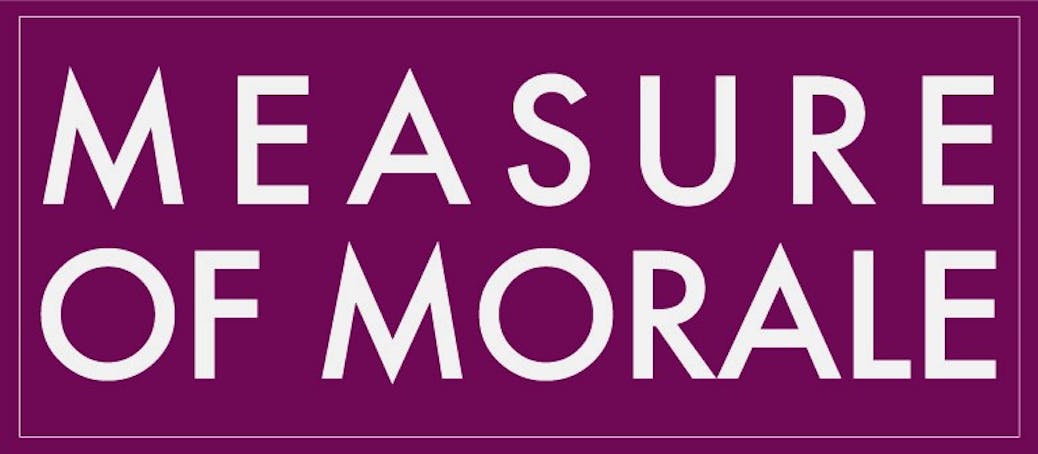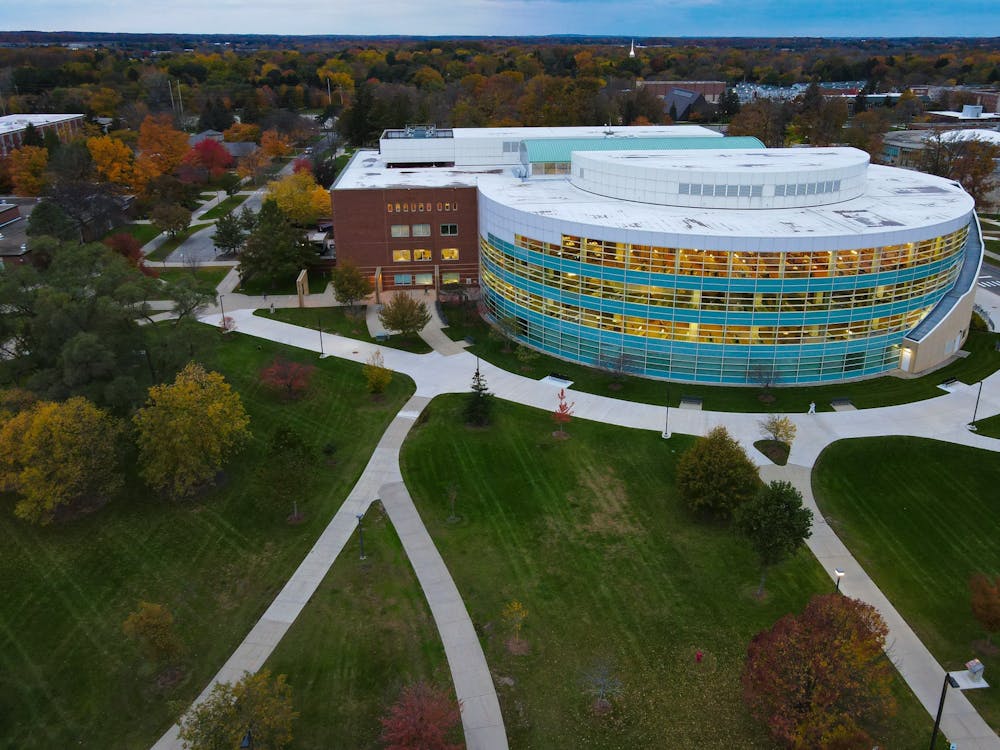Measure of Morale: Students weigh in on COVID-19, campus events and dining halls
EDITOR'S NOTE: This story is part of a series of articles that gather the opinions of the campus community during the 2021-22 academic year. If you have an opinion to share, send it to editor@cm-life.com.

While students walk down the halls and streets of Central Michigan University, their faces are hidden behind masks and the concerns they may have during their days at CMU have gone unseen.
The list of issues students are working through while at the university this year includes the continuing disruption of COVID-19, signs of dwindling enrollment apparent throughout the empty campus, the constant churn of administrators coming and going, and ongoing dining hall quality issues.
Students are trying to make the best out of their time at college, but the anxiety around campus is apparent.
"Most student opinions right now are pretty negative, I feel like as a university, we've got to work to somehow increase morale amongst the campus," the director of external affairs for the Student Government Organization, Sarah Gum, said.
As the list of issues grows, students at CMU have taken a stance of passive adaptation.
“I feel like everything just seems dull, just because everyone is just going through the same motions all the time,” said Emily Dickerson, Fraser, junior. “I definitely feel like there’s a better atmosphere compared to last year when everything was online and super restricted.”
COVID-19 protocol gets positive reactions
Sterling Heights freshman John Schultz was positive about his experience at CMU so far. He was satisfied with the way the administration had handled their COVID-19 response.
“I would say that most of the time people are going where they please and it seems like a really nice vibe,” Schultz, said. “I never feel like I’m in danger, people are usually good about wearing their mask."
COVID-19 had a severe impact on the way students experienced college. The methods of learning were changed dramatically as the university changed into an online format.
Although there are some options for online classes still, learning has primarily moved back into the classroom. And according to students on campus, for the better.
“I prefer to be in person because I do better when I’m in person, but whatever happens, happens,” said Juliet Wagner, Warren freshman.
Others had some concerns about how the university was operating with the ongoing pandemic.
Lindsey Steffey, a Jackson senior, does prefer to have class in person. As an art student, her classes primarily rely on hands-on work that cannot be done virtually. However, that isn’t to say she hasn’t thought about alternatives.
“I’m wondering if they’re sacrificing our health and safety for being in person,” Steffey said.
While students on the university campus are generally satisfied with the COVID-19 protocols, Gum said that Legislation being put forward in SGA would urge administration and faculty to allow students in quarantine to access classes in a Hyflex format.
Groups on campus stay busy, others are left without
With the university implementing its COVID-19 protocols to create a safe return to the university, also comes a return of in-person activities. Although, this has not been universally returned to the campus.
“If you’re part of a group, then there’s always something going on,” said Ace McClelland, a Port Huron freshman. “If you’re not a part of a group then it’s really hard to find something unless you see people out and about promoting.”
Grad student Mori Ogundipe, from Nigeria, said that while he was an undergrad, you would be more likely to see things going on around campus. That has changed since COVID-19.
"Before COVID it was definitely more lively, more people were everywhere," Ogundipe said.
Promotion of events is not the only issue. Students were mixed on how their experience was within residence halls. Where in years past, open dorm doors and talking in the halls have given way to quiet.
Schultz said that in Larzelere Hall his experience has largely been closed doors, despite him knowing the majority of the students there.
Others, like freshman Ari Light from Tampa, Florida, have had starkly different experiences. Light lives in Celani Hall, a dorm with primary athletes, which she said contributes to the liveliness of the floor.
“People are always in the halls and always hang out,” she said.
The food is still bad
An almost general consensus among students is the lack of quality food and lack of service from new food service provider Chartwells.
"I would say the food is my least favorite thing here," said Mia Phan, a Muskegon freshman.
Concerns about food in the dining halls have increased since CMU has signed a food service contract with Chartwells. With students and university parent groups alike complaining about the dining halls on social media.
As a part of the contract, CMU requested that there be an increase of options in dining halls. Primarily, limiting processed food and increasing fresh foods and healthy options.
“Usually, the line is out the door for the fried foods because they don’t know how to cook the healthy food,” Light said. “The food is definitely not up to par for athletes.”
A lack of diversity in dining options was a problem for a few students. Often saying the food was hit or miss, with students thinking the food wasn’t good more than three days out of the week.
That is when they could get the food.
“It’s more of a problem being in the south community not having our dining hall open,” Wagner said.
Social House in the south community is a dining hall that is only open Monday through Thursday, 6 p.m. to 11 p.m. Meaning that students could be required to eat the entirety of their meals elsewhere on campus, despite living in the south community.
SGA is currently working on additional legislation that would work to compensate students affected by low food quality, Gum said, and difficulty in obtaining meals with limited hours of service.
That legislation was most recently vetoed by SGA President Kate King following SGA's Feb. 7 meeting but will continue to receive edits in the coming weeks.
CMU Confessions offers an anonymous outlet for opinions
A Twitter account has been the sounding board for student concerns for more than five years. CMU Confessions is an account where users can anonymously send in tweets that will get posted without identifying information. The account has become a place for people to openly discuss their issues with the university, without fear of consequence.
“Administration needs to be held accountable before CMU goes to hell in a handbasket,” one tweet reads.
The account's tweets are often much more critical of CMU administration and policy than students are willing to discuss in the open.
Although anonymous, the tweets often mirror those concerns discuss in class and in other venues on campus.
"With the ‘amazing’ (sarcasm) food we are offered with on camps who all wants to leave an anonymous tip to the Central Michigan Health Department and get an investigation going???" another post said.
Other tweets claimed food had made them sick. Photos on Twitter have even shown moldy bread and undercooked chicken.
Another concern among those who submit tweets to CMU Confessions is the university’s response to COVID-19.
"So disappointed in CMU and how they are with covid this semester,” one tweet read. “I am basically getting penalized for having covid and missing out on all material/lecture because there is no HyFlex option. Falling behind and I couldn’t be more stressed out"
Other posts urged CMU to go online, even more, asked for more leniency when students contract COVID-19.
Concerns surrounding the administration and university policy can be directed to the board of trustees during formal meetings by completing a request to address the board. The next formal meeting will be taking place on Feb. 17 at 11 a.m.
Additionally, students can address the Student Government Association during its Monday forums, held in the UC Auditorium at 7 p.m.







